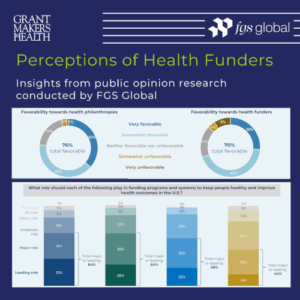Survey Findings: Perceptions of Health Funders
In July and August 2025, Grantmakers In Health (GIH) conducted research to help health funders better understand how they are viewed by the public. The research included an online survey of engaged voters nationwide and an online focus group with Washington, DC, policy professionals.
An overview of the survey and online focus group findings is now available to all GIH Funding Partners. In addition, this overview was presented on Thursday, November 20, 2025, at the 2025 GIH Health Policy Exchange in Arlington, VA.
Outreach to Uninsured Children: Recent Foundation Initiatives
This GIH Issue Focus outlines what grantmakers are doing to reach uninsured children.
Strengthening and Maintaining the Public Health Infrastructure
This Issue Focus article presents information on the issues facing the nation’s public health infrastructure and how health grantmakers help strengthen the system by partnering with federal, state, and local health departments, as well as with academic institutions and community groups that contribute to the public’s health.
Protecting Safe Havens for the Nation’s Children
In the U.S., children continue to suffer from violence in environments that should be safe havens for them: their schools and their homes. This Issue Focus presents philanthropic strategies for transforming homes and schools into safe environments where children can thrive and reach their full potential.
Healthy Behaviors: Addressing Chronic Disease at Its Roots
Chronic diseases such as heart disease, cancer, lung disease, stroke, and diabetes are among the most serious threats to the nation’s health. This Issue Brief explores the contribution of specific behaviors to the development of chronic diseases and discusses how research on tobacco control can guide grantmakers interested in designing comprehensive strategies that help people adopt healthy behaviors and create environments that help people be successful in their efforts to live healthier lives.
Grantmakers Respond to Medication Errors
Medication errors are among the most common preventable medical errors. This Issue Focus article discusses a variety of strategies to reduce medication errors, from relabeling similarly named medications to purchasing and implementing new technologies in institutional settings, and how foundations can facilitate the adoption of these and other strategies.
Shoring Up the Safety Net: Grantmakers Act to Strengthen Providers Serving the Underserved
Health grantmakers are working to shore up the safety net in various ways. This Issue Focus explores grantmaker activities beyond providing funding for direct services and capital improvement, including strengthening organizational capacity, supporting community-based health plans, and educating policymakers.
Join & Become a GIH Funding Partner Today!
Click here to learn more about becoming a GIH Funding Partner and joining the largest national network of health funders.

